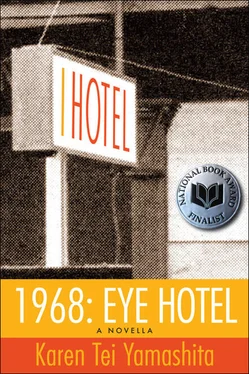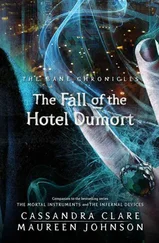Some Chinese kids were hanging outside a storefront, smoking in a group. “Hey, Paul,” they nodded in recognition. He knew them from the Y. Now they were hanging out at Leway’s, playing pool after school every day.
“Hey,” he answered coolly.
“You at State now?”
“Right.”
“Cool, man. Heard it’s tripping there.”
“Yeah.”
“I could do that. Cherry bombs. Shit.”
The group all simultaneously puffed into the air and laughed.
Paul shrugged and walked on. “Back to my history lesson,” he prodded Chen, who had conveniently become momentarily invisible.
“I lost touch with your father for a while after your mother died. But he promised to raise you. And I suppose the Monkey Block didn’t seem like a place to raise a child. Not that you were living there. He had already given up his studio. He was probably under investigation by the FBI. You were born right in the middle of those years when Joseph McCarthy was active. Remember, your father had a history in Paris with Chou En-lai, and he was friendly with all the wrong people: Rivera, the revolutionary artists’ club. They had us all running scared.”
So this was the avuncular role Chen took on with his friend’s son, now his student, as if he could retreat into a romantic past, escape the revolution that threatened his bourgeois intellectual role. In any case, Paul was about to live his own youth.
Paul met his friend Edmund. “Are you thinking about learning a third language now that you’ve mastered English and Chinese?”
“I’m working on Mandarin. Does that count?” Edmund spoke with a Shanghai dialect.
“I guess so.”
“Our acting president is going to be honored by the Japanese American Citizens’ League at a banquet on the wharf. We’re going out there to protest. Coming?”
“I’ve got to work that night.”
“Right.”
“I’ve started writing articles for the newspaper East West. If you take notes about the protest, I’ll write the article. We can share the byline.”
“Good idea.”
As it turned out, Paul’s notes were interesting but useless. Edmund Lee discovered that the banquet he was waiting tables at that evening was the very JACL banquet in question. Paul covered the one hundred protestors on the cold, wet wharf outside the restaurant that evening, and Edmund listened to the president’s speech and briefly interviewed him in the kitchen as he snuck out the back and up to a waiting helicopter on the roof to avoid the angry hubbub. Only Japanese Americans would go to so much trouble to avoid conflict. Edmund thought if it were the Chinese, the Six Companies would have just hired their goons to take care of business.
Edmund listened to the president’s speech with interest, scribbling notes at intervals and stuffing them into his white coat pocket. It all made beautiful sense. For example: What kind of language we speak largely determines the kinds of thoughts we have. He went on to explain that the informal and formal structures of our language determine the way we interpret our experiences and therefore the way we act in any given circumstance. Edmund thought about himself, his accented English and the Shanghai Chinese that ran under and around his speech and writing. How was this speech controlling his thinking and actions?
The president looked out on his Japanese American audience and gave the example of his Meiji Japanese immigrant mother. “Shikataganai,” he intoned, for example. All the nisei nodded and thought about mama. “‘It can’t be helped.’ Or, ‘don’t cry over spilled milk.’ The sanseis who are out there rabble-rousing against me hate this idea of shikataganai. They have their points to make, but they don’t understand the source of strength that this idea comes from, the ability to endure suffering and sacrifice. Our parents, the issei, interpreted it to mean endurance, but we nisei probably interpret it to mean don’t cry over spilled milk, so let’s get on with it and move to the next thing.”
The audience murmured approval. They fancied themselves a bunch of positive pragmatists. How else could they have come so far?
“But the sanseis,” he continued, “interpret shikataganai to be a show of weakness. You hear it from the students all the time. They say, We don’t believe in shikataganai; that’s why you all got sent to camp, because you gave in.’ But you all know it’s not so simple. Well, what is shikataganai anyway? It’s just a word, or series of words, and we’ve got to communicate better with each other about what we mean when we say or think it. And until we have this honest exchange with our children, when we really listen to each other, we won’t bridge the gap that is growing between us.”
Edmund bused some abandoned dessert plates and hurried back to fill the glasses with ice water. He could sense the approval of the nisei as they stirred the cream into their coffees. They were willing to take a little browbeating from the president. After all, here was a very reasonable man who wanted communication and exchange, and they should follow his example. Obviously those sansei on bullhorns out there were incapable of listening.
Edmund did everything slowly and carefully and obsequiously, nodding graciously to every guest like an invisible immigrant. No one suspected he was a brilliant student in Chinese studies at the president’s college. He was going to make himself necessary as long as possible. Meanwhile, Paul was outside chanting to keep warm, leafleting the tourists and standing next to the signs that said, “We Orientals may look alike, but we don’t all think alike.” Someone had created a life-sized puppet complete with tiny mustache, tam-o’-shanter, glasses, suit, and tie. The puppet was held aloft in the air with poles and entertained the crowd with foolish antics while someone screeched into a bullhorn: “Don’t touch me! I’m the president!” And the crowd answered in unison: “No! You’re a puppet! You’re a puppet!”
Inside, the president was explaining something he called time-binding. “Time-binding is what distinguishes human beings from other living things. Plants,” he said, “survive by their ability to energy-bind, that is, a system for taking energy from the environment to feed their organisms. Animals survive by the hunt, or their ability to move around to get their food; this is what we call space-binding. But humans are unique in that we survive by our ability to time-bind, that is, by using and controlling time.”
About this time, Edmund slipped around the tables and poured coffee, as if coincidentally to nudge a few from nodding off to sleep. They gratefully brought the cups to their lips and regained their alert and interested composures. Edmund rushed back to fill his carafe with hot coffee and jotted time-binding into his notes.
“What are you doing?” another waiter queried.
“Getting more coffee,” Edmund parried.
“We get paid by the hour for this. No tips.”
“Yeah.”
“It’s a goddamned banquet. Relax.”
“Right.” Edmund rushed back to hear more about time-binding.
“Humans,” the president continued, “have created language to communicate, to pass on vital information to each other and to the next generation. That’s how we survive over time. This time-binding capacity is another name for our ability to create society and civilization.”
One JACLer waved Edmund over and asked for an ashtray. Edmund returned with the ashtray, popped a lighter from his pocket, and lit the man’s cigarette.
“For example, the JACL is a society of citizens that depends on communicating your purpose and your history. This, I agree, is the difficult task ahead.” Outside, the president’s puppet was going through the motions of ritual disembowelment while the crowd chanted, “Haya-kiri, haya-kiri, haya-kiri . . .”
Читать дальше












